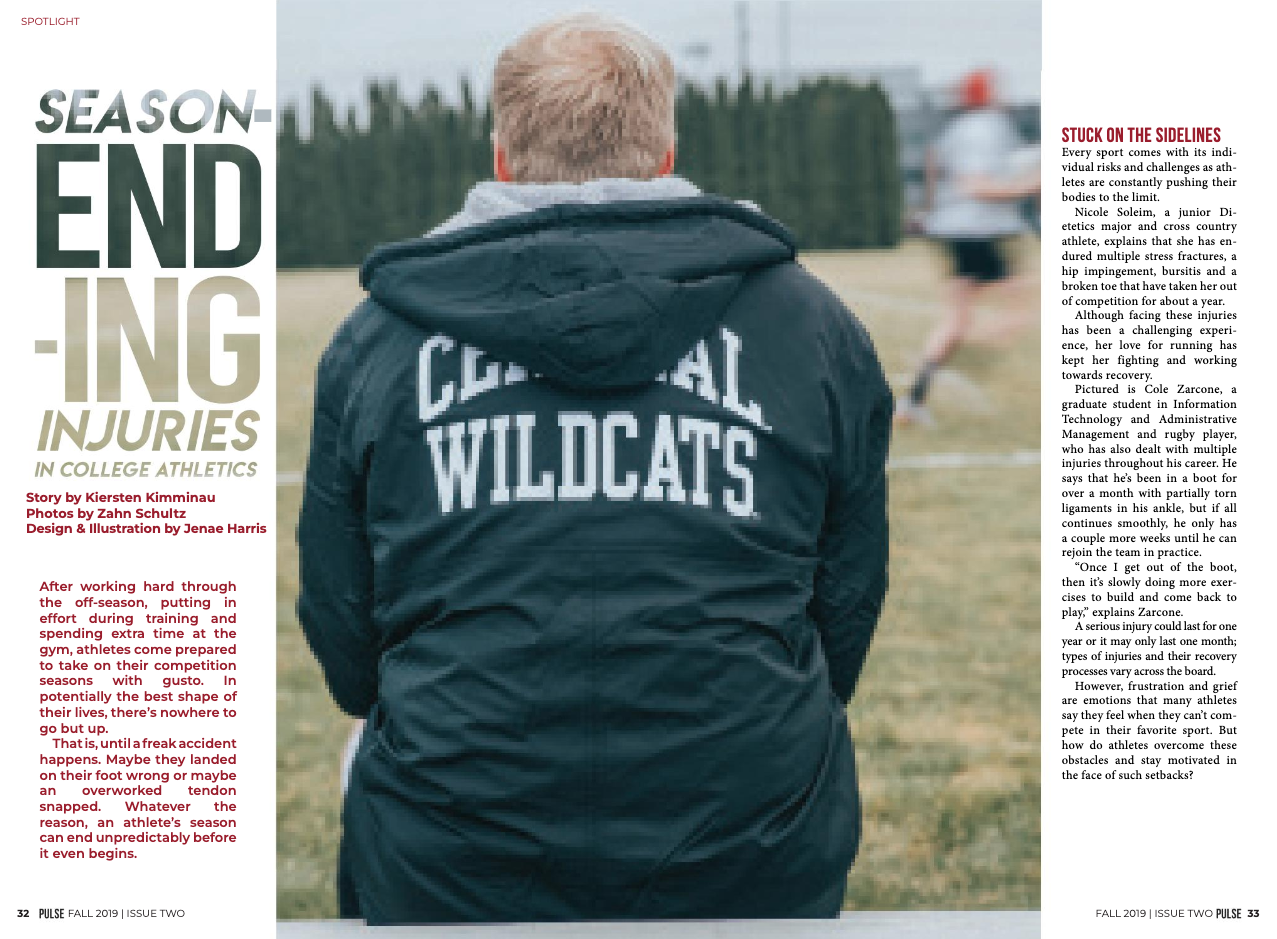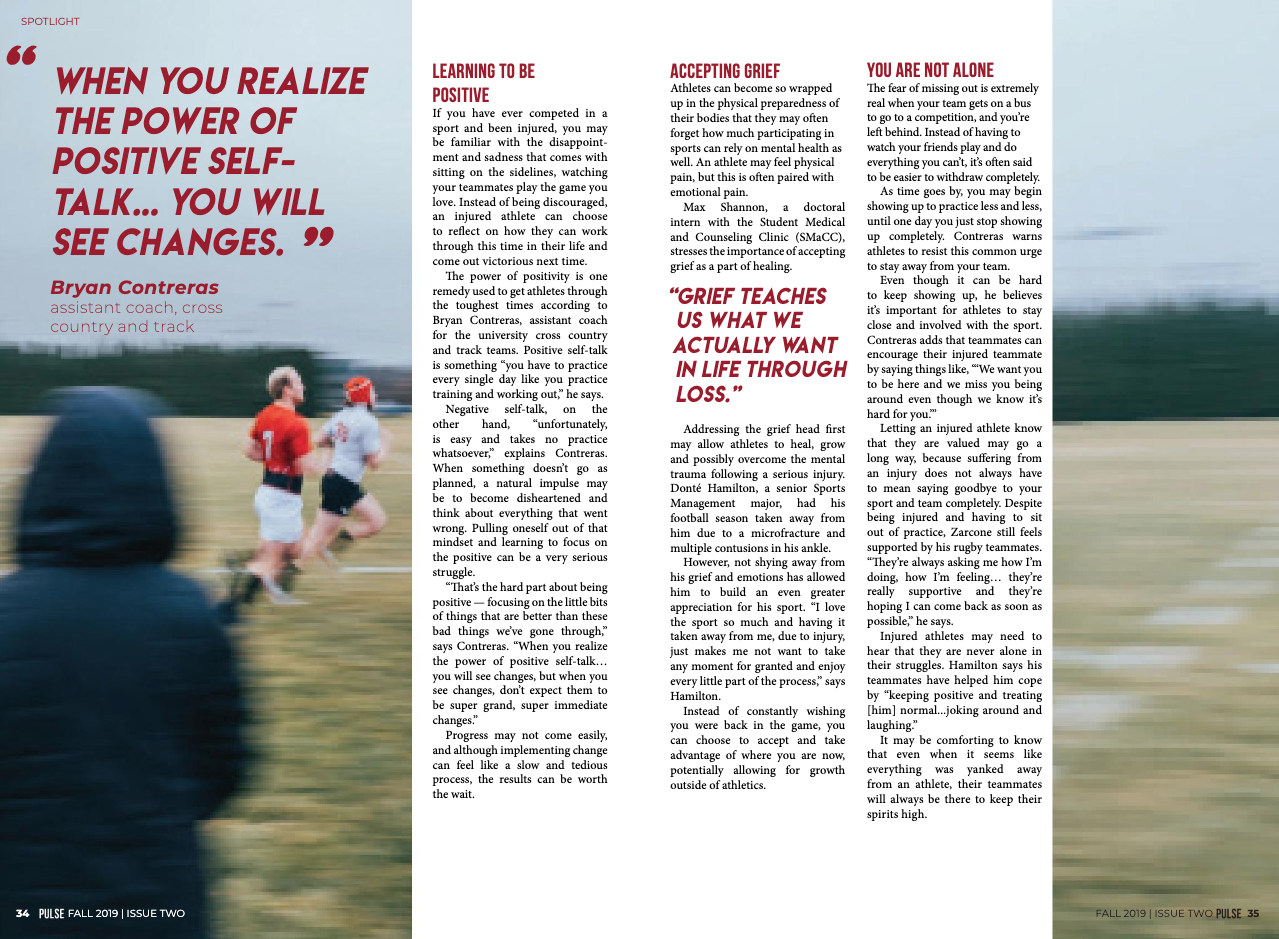Season-Ending Injuries in College Athletics
Story by Kiersten Kimminau | Photos by Zahn Schultz | Design & Illustration by Janae Harris
After working hard through the off-season, putting in effort during training and spending extra time at the gym, athletes come prepared to take on their competition seasons with gusto. In potentially the best shape of their lives, there’s nowhere to go but up.
That is, until a freak accident happens. Maybe they landed on their foot wrong or maybe an overworked tendon snapped. Whatever the reason, an athlete's season can end unpredictably before it even begins.
Stuck on the Sidelines
Every sport comes with its individual risks and challenges as athletes are constantly pushing their bodies to the limit.
Nicole Soleim, a junior Dietetics major and cross country athlete, explains that she has endured multiple stress fractures, a hip impingement, bursitis and a broken toe that have taken her out of competition for about a year. Although facing these injuries has been a challenging experience, her love for running has kept her fighting and working towards recovery.
Cole Zarcone, a graduate student in Information Technology and Administrative Management and rugby player, has also dealt with multiple injuries throughout his career. He says that he’s been in a boot for over a month with partially torn ligaments in his ankle, but if all continues smoothly, he only has a couple more weeks until he can rejoin the team in practice. “Once I get out of the boot, then it’s slowly doing more exercises to build and come back to play,” explains Zarcone.
A serious injury could last for one year or it may only last one month; types of injuries and their recovery processes vary across the board. However, frustration and grief are emotions that many athletes say they feel when they can’t compete in their favorite sport. But how do athletes overcome these obstacles and stay motivated in the face of setbacks?
Learning to be Positive
If you have ever competed in a sport and been injured, you may be familiar with the disappointment and sadness that comes with sitting on the sidelines, watching your teammates play the game you love. Instead of being discouraged, an injured athlete can choose to reflect on how they can work through this time in their life and come out victorious.
The power of positivity is one remedy used to get athletes through the toughest times according to Bryan Contreras, Assistant Coach for CWU cross country and track teams. Positive self-talk is something “you have to practice every single day like you practice training and working out,” he says.
Negative self-talk, on the other hand, “unfortunately, is easy and takes no practice whatsoever,” explains Contreras. When something doesn’t go as planned, a natural impulse may be to become disheartened and think about everything that went wrong. Pulling oneself out of that mindset and learning to focus on the positive can be a serious struggle.
“That’s the hard part about being positive — focusing on the little bits of things that are better than these bad things we’ve gone through,” says Contreras. “When you realize the power of positive self-talk… you will see changes, but when you see changes, don’t expect them to be super grand, super immediate changes.”
Progress may not come easily, and although implementing change can feel like a slow and tedious process, the results can be worth the wait.
Accepting Grief
Athletes can become so wrapped up in the physical preparedness of their bodies that they may often forget how much participating in sports can rely on mental health as well. An athlete may feel physical pain, but this is often paired with emotional pain as well.
Max Shannon, a Doctoral Intern with the SMaCC, stresses the importance of accepting grief as a part of healing. “Grief teaches us what we actually want in life through loss,” explains Shannon.
Addressing the grief head first may allow athletes to heal, grow and possibly overcome the mental trauma following a serious injury. Donté Hamilton, a senior Sports Management major, had his football season taken away from him due to a microfracture and multiple contusions in his ankle, which removed him from competition for the rest of the season.
However, not shying away from his grief and emotions has allowed him to build an even greater appreciation for his sport. “I love the sport so much and having it taken away from me, due to injury, just makes me not want to take any moment for granted and enjoy every little part of the process,” says Hamilton.
Instead of constantly wishing you were back in the game, you can choose to accept and take advantage of where you are now, potentially allowing for growth outside of athletics.
You are not Alone
The fear of missing out is extremely real when your team gets on a bus to go to a competition, and you’re left behind. Instead of having to watch your friends play and do everything you can’t, it’s often said to be easier to withdrawal completely.
As time goes by, you may begin showing up to practice less and less, until one day you just stop showing up completely. Contreras warns athletes to resist this common urge to stay away from your team.
Even though it can be hard to keep showing up, he believes it’s important for athletes to stay close and involved with the sport. Contreras adds that teammates can encourage their injured teammate by saying things like, “‘We want you to be here and we miss you being around even though we know it’s hard for you.’”
Letting an injured athlete know that they are valued may go a long way, because suffering from an injury does not always have to mean saying goodbye to your sport and team completely. Despite being injured and having to sit out of practice, Zarcone still feels supported by his rugby teammates. “They’re always asking me how I’m doing, how I’m feeling...they’re really supportive and they’re hoping I can come back as soon as possible,” he says.
Injured athletes may need to hear that they are never alone in their struggles. Hamilton says his teammates have helped him cope by “keeping positive and treating [him] normal...joking around and laughing.”
It may be comforting to know that even when it seems like everything was yanked away from an athlete, their teammates will always be there to keep their spirits high.
The Road to Recovery
This journey to restored health is one that may take patience but for passionate and driven athletes eager to return to their sport, the healing process may feel never-ending.
Even when an athlete is given clearance to return to competition, it can feel like a game of catch-up trying to restore the fitness that was lost from extended time away from the sport. Although it might feel great to practice pain-free, it may still be hard for athletes to come back not feeling like they’ve missed out and fallen behind in progress. Old goals suddenly may feel out of reach as athletes wonder how they’ll make up for all the lost time.
Understanding this sentiment all too well, Contreras wishes he “had a magic answer to make it better.” He can relate to the struggle of feeling lost and hopeless after suffering from injuries in his collegiate competition days. Having gone through the experience and successfully come out the other end, he urges athletes to stack the little victories every day.
Embracing Growth
After his days competing in collegiate athletics came to an end, Contreras recalls thinking, “‘If I was done, then who the heck was I?’” This is a feeling many athletes may be able to relate to. Sports may take up a huge part of a student athlete's life, so when it's over, what comes next?
Everyone may eventually face the fact that nothing lasts forever; this is no different for athletes. When it comes to their sport, time may be limited. When it’s time to say goodbye to that part of your life, it may feel like saying goodbye to a crucial part of your identity.
Now an athlete may be tasked with finding productive ways to fill time that was once spent practicing and playing the sport they loved. Finding new outlets does not necessarily mean having to completely avoid your sport and the parts of it that make you happy.
In addition to physical prowess within a sport, athletes may also gain other skills that can be applied throughout many aspects of life. Cindy Bruns, Director of CWU Counseling Services at the Student Medical and Counseling Clinic (SMaCC), urges athletes to think, “How do you take those strengths” gained from competing in sports, “and find other avenues in which you can let those out? Because they don’t go away, they just transform.”
At first, it may be difficult to accept that your outlets need to be adjusted. Soleim says, “There was a point in time where it could have been an option that I was not going to be able to run anymore, and that hit really hard.” Even though this possibility was hard to handle and navigating injury is still a struggle to this day, Soleim also realizes, “you are more than your sport.”
An athlete can remind themselves over and over that their sport does not define them. Yet it still can be frustrating when a large portion of your identity, athletics, gets taken away. Contreras says, “When we get in a situation where we can’t do the thing we want to do, we can get lost,” and start questioning “where we’re at and who we are.” However, he says if you “change your thinking dial just a little bit, it can add to who you've been and who you’re growing into.”
Injuries can seem like the absolute worst outcome, but try switching that dial. Think about all of the opportunities for growth that can come out of pain. Maybe the storm you’re facing is actually a stage for something new to come.





